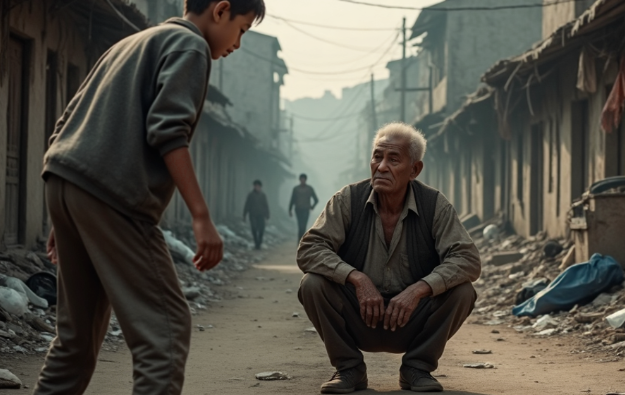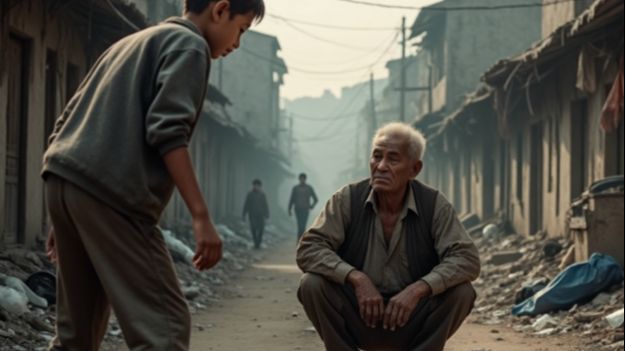In the Chinese family structure, the traditional model of three generations living together should convey the virtue of respecting the elderly and loving the young. However, a worrying phenomenon is quietly happening: young children beat and scold their grandparents at will, but parents let them go on the grounds that "the children are still young." This seemingly harmless indulgence is like a seed planted in the young mind, and the consequences of crime grow over time.

When the child who once beat and scolded his grandfather finally embarked on the road of crime, what we see is not only an individual tragedy, but also a comprehensive bankruptcy of an educational philosophy and a vicious evolution of a series of psychological mechanisms. Behind this involves complex interactions of multiple psychological factors such as early behavioral shaping, empathy ability development, moral internalization process, and family system dynamics.
1. The psychological meaning of early aggressive behavior: uninterpreted help signal
Children's aggressive behavior towards elders is by no means a simple summary of "ignorance", but an external manifestation of multiple psychological needs.
Exploring the Nature of Boundaries: Children test the boundaries and rules of the world through behavior. Beating and scolding grandfathers may initially be an exploration—“What can I do to my elders?” “What consequences will my behavior bring?” When parents do not intervene, the message the child receives is: “This behavior is allowed and has no consequences.”
Performance of seeking attention: Even negative attention is better for children than ignored. Children may find that parents only pay attention when they act aggressively against their grandfather (even saying "don't do this" with a smile), which reinforces this behavior.
Lack of emotional expression ability: Young children have not yet developed perfect emotional expression and regulation ability. Emotions such as anger, frustration, and sadness may be vented through aggressive behavior. Grandparents tend to be safe “emotional trash cans” because they usually don’t fight back.
Experience of a sense of power: In an adult-dominated world, children often feel powerless and insignificant. Ability to react with aggressive behaviors such as adults (even older grandfathers) brings a distorted sense of power and control to children.
2. The psychological motivation behind parents’ indulgence: avoidance and projection
Parents condonize improper behavior on the grounds that "children are young" reflect a series of complex psychological dynamics.
Conflict avoidance tendency: Many parents are extremely avoiding family conflicts and parent-child tension. Correcting children's behaviors may cause children's dissatisfaction and crying. To avoid this discomfort, parents choose the easiest way - inaction.
The role of compensatory psychology: Some parents themselves are strictly disciplined during childhood, so they are determined to "better" to their children. This undifferentiated "good" often slides to condonization, mistakenly treating any constraints as harm to the child.
Emotional transfer to one’s own parents: There may be unresolved emotional conflicts between parents and their own parents (the children’s grandparents). Allowing children to be disrespectful to their grandparents may subconsciously satisfy their desire to attack their parents.
Misunderstanding of development concepts: equating "children are still young" with "not understanding ability", ignoring the foundational role of early experience on personality formation. Developmental psychology shows that moral sense and empathy begin to develop from infancy, rather than waiting until the "age of sensibility" suddenly forms.
3. Blockade of the development of empathy ability: From ruthlessness to anti-social
The ability to empathize—the ability to understand and share other people’s feelings—is the cornerstone of human moral development. The development of this capability requires appropriate environment and guidance.
Inadequate activation of the mirror nervous system: The mirror nervous system in the human brain is responsible for helping us "feel" the experiences of others. When a child beats and scolds his grandfather, if the adult does not help the child recognize and understand his grandfather's feelings ("You see, the grandfather hurts, he is very sad"), the child's mirror nervous system will not be properly activated and the empathy ability cannot be developed.
Lack of emotional vocabulary: Without adult guidance, children cannot name their emotions and victims’ feelings. Unnameable experiences are difficult to integrate into moral cognitive structures.
Lack of Consequence Awareness: Children learn to understand cause and effect and responsibility by observing others' reactions to their own behavior. This learning process is interrupted when the behavior does not have clear consequences, resulting in serious flaws in the consciousness of consequences.
4. Failure of moral internalization: defects formed by superego
According to Freud's theory of personality structure, the formation of the superego (moral conscience) requires internalizing the values and social norms of parents. This process is severely damaged in the conniving environment.
External control and internal control: In normal development, children gradually develop from relying on external control (parent stop) to internal control (self-discipline). Indulgence keeps the child in the external control stage forever - it is possible to restrain behavior only when others are present and will intervene. This is why some children are lawless at home but relatively disciplined at school.
The confusion of shame and guilt: The healthy superego is based on guilt (feeling sad about what I did wrong), not shame (I am bad in myself). Indulgences cannot help children distinguish between behavior and personality, either develop excessive shame or complete lack of moral discomfort.
The continuation of the sense of omnipotence: the sense of omnipotence in infancy (as soon as I cry, my breasts come) needs to be gradually broken during my growth to adapt to the real society. Indulgence continues this sense of infancy all-roundness into childhood and even adulthood, forming a "self-centered" worldview: my needs and desires must be met, no matter what impact it has on others.
5. Family system dynamics: distorted power structure and alliances
Children’s behavioral problems often reflect dysfunction of the entire family system.
Inversion of power hierarchy: Healthy families need clear intergenerational boundaries and power structures - parents are responsible for discipline and children are disciplined. When the child can beat and scold his grandparents at will but the parents do not stop him, the family's power structure is inverted and the child gains inappropriate power and status.
The formation of cross-generational alliances: Parents may subconsciously form alliances with their children, and express dissatisfaction or contempt for their ancestors through acquiesce to their children's behavior. This distorted alliance further undermines grandparents’ status and authority.
Victim reinforcement: Grandparents tend to be in a relatively disadvantaged position in the family, coupled with their spoiling for their grandchildren, make them “ideal victims.” This victim-perpetrator dynamic once formed, may extend to other relationships.
6. From family to society: the path to the formation of criminal psychology
The child who beat and scolded his grandfather eventually went to crime, not a sudden change, but developed along a predictable psychological path.
The solidification of behavioral habits: The behavioral patterns formed in childhood continue to strengthen and solidify over time, becoming the default reaction method. Attacks become the preferred tool for conflict resolution and acquisition.
Intensification of empathy defects: The long-term lack of empathy training leads to serious empathy defects, inability to understand and care about the suffering of the victims. This is a key factor in the formation of antisocial personality.
** The expansion of entitlement**: The sense of omnipotence and self-center formed in childhood gradually develop into a strong sense of privilege-I think I have the right to get everything I want, no matter what means.
Reduced consequence sensitivity: Due to the long-term lack of clear and consistent behavioral consequence consequences, prefrontal cortex function in the brain responsible for risk assessment and consequence prediction may be insufficient, leading to impulse control and future-oriented thinking deficits.
7. Intervention and prevention: Rebuilding healthy development paths
To break this vicious cycle, multi-level family intervention and educational reconstruction are needed.
Establish clear and consistent rules: Children need clear and consistent behavioral boundaries and natural consequences. Parents need to overcome conflict avoidance and enforce the rules firmly and gently.
Daily empathy education: Use daily opportunities to help children identify their own and others' emotions and understand the impact of behavior on others. "Look, Grandpa is very sad because you hit him. We need to apologize to Grandpa."
Repairing intergenerational boundaries: Restore appropriate family power structures and clarify adult authority and responsibilities. Grandparents should be respected and parents should bear the responsibility for discipline.
Emotional management training: Teach children to express emotions such as anger, frustration, etc. in appropriate ways, such as expressing dissatisfaction with words rather than fists.
Professional early intervention: When it is found that the child continues to exhibit aggressive behavior and it is difficult for parents to manage, you should seek help from a child psychology professional as soon as possible, rather than waiting for "it will be better when you grow up."
Conclusion
The child who went from beating and scolding his grandfather to going toward crime, his story is a warning allegory about how neglect and indulgence distort human development. Children’s “smallness” is not a reason for indulgence. It is precisely because they are “small” that they need timely and appropriate guidance and regulation.
The educational concept of "treating nature straight" has proven to be a dangerous illusion in modern society. The kindness of human nature is not the result of natural growth, but the product of careful cultivation; the bottom line of morality is not an innate gift, but a course that requires repeated teaching and intensiveness.
Every child has the potential to move towards kindness and evil at the same time. The direction of education determines which path will be opened and strengthened. When we use the excuse of "children are still young" to condone obvious wrong behaviors, we are not loving children, but depriving them of the opportunity to develop sound personality and moral conscience.
Ultimately, the responsibility of educators is not only to meet children's material needs, but also to help them become members of society who can respect others, abide by the rules, empathize and have a sense of responsibility. This task started when the child beat and scolded his grandfather for the first time. At that time, appropriate guidance may prevent the tears of regret in prison in the future. The window of opportunity for education is short and precious. Once missed, the price may be the safety of the child’s life and society.
